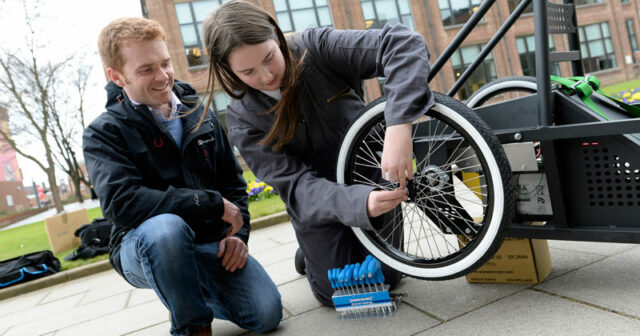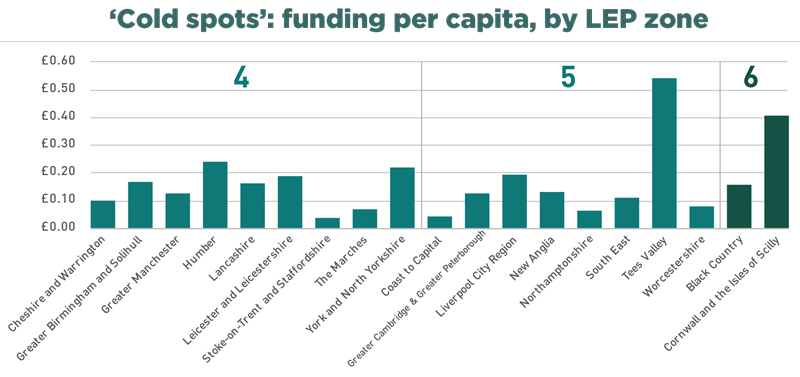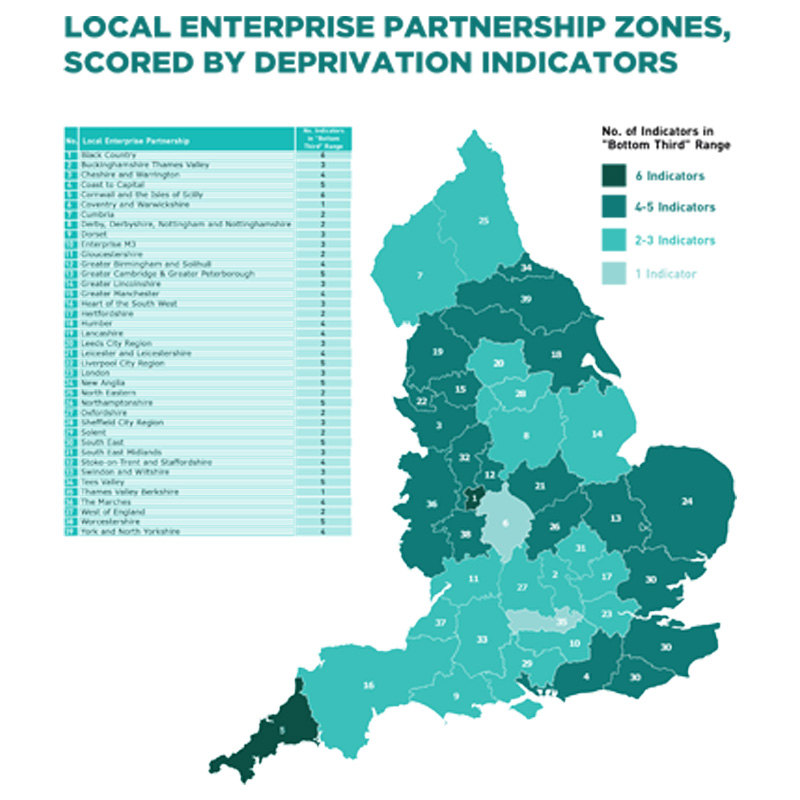Thirty-three careers programmes are to share a £9.5 million fund to run projects in areas of need across England. But who are they, and what do they want to do with the money?
The Careers and Enterprise Company, set up by Nicky Morgan in 2014 and boosted earlier this year with a large chunk of the government’s £70 million careers funding, has announced its list of chosen projects aimed at “areas of greatest need”, many of which are working with schools.
While the company devotes much energy to its flagship mentoring scheme, it has also allocated £5 million to 33 providers (see list below) in a selection process weighted to favour “cold spots” of careers provision – although Schools Week analysis revealed the process has not resulted in equal distribution among all the deprived areas.
Groups of schools and academy trusts were among those invited to bid for the funding when it was announced last autumn.
The organisation hopes 250,000 young people will be reached by the projects, which have each received a share of a £9.5 million pot – the £5 million boosted by £4.5 million in match funding from other groups.
Organisations were chosen based on their “strong track record in helping young people who have previously lacked good quality careers support”, with up to 75 per cent of the funding allocated to careers “cold spots”.
To work out the geographic areas in highest need, the company analysed data on ten indicators including free school meals eligibility, work experience exposure and availability, exam results, apprenticeship destinations and proportion of young people out of work or education in each area.
Cold spots were identified as local enterprise partnership (LEP) zones with four to six of the indicators in the bottom third range.
Areas with a higher number of indicators in the “bottom range” of results will benefit from more intervention. In the Tees Valley, which has five indicators in that range, £360,000 will fund nine projects.
The Black Country, which has six indicators in the bottom range, will benefit from £179,000 for eight projects, while five projects funded with £219,000 will be deployed in Cornwall and the Isles of Scilly, which also has six indicators in that range.
In Liverpool, £289,000 of funding will pay for seven projects, including a service offering careers advice and work inspiration for 13 to 19-year-olds in hard-to-reach schools.
The fund was launched last October, and the company received 247 applications requesting more than £55 million. One hundred applications were shortlisted and of 50 bidders invited to interview, 33 were chosen to split the £9.5 million.
Claudia Harris, a former adviser to Tony Blair and the company’s chief executive, said the programmes were selected following a “rigorous process”, adding that each had demonstrated “a particular focus on employer encounters” and showed a “track record of success”.
She said: “This is a real opportunity to level the playing field for young people in cold spot areas who have traditionally not had the kind of access to employers and encounters that others enjoy.”
Harris also defended the allocation process, after Schools Week analysis highlighted large variations in the per-capita allocation between LEP areas in similar categories.
For example, areas like Tees Valley and Cornwall received far more per head than other areas like Worcestershire or the Black Country, which were also considered to be in careers “cold spots”.
Harris said the “lumpy” nature of local grant funding drove swings in per capita funding, adding: “Moving a large local project from one LEP to another moves the fund/population significantly.”
She added that some grants were location-specific, and that the company had sought to balance regional coverage with backing or testing the highest quality interventions and funding a range of intervention types.
“We chose to back some projects that were more expensive per capita because they focused on high-need groups,” she said.
Case Studies
‘It creates lasting connnections’
A £150,000 grant to the Greenpower Education Trust will allow teams of pupils in Hull to design and race kit cars while building relationships with business representatives.
Schools will receive half the funding needed for a car (about £3,300) and teams of at least 20 pupils will get the chance at school to design, build and market the vehicle.

Pupils will be encouraged to get involved in raising the other half of the funding, and the teams can go on to race their designs at a national and international level. The cars can also be stripped down and rebuilt, enabling the kits to be used again.
Vaughan Curnow, from Greenpower, says the value of the project is that it outlasts the initial build. It creates lasting connections between teams and their professional advisers, who continue to support schools with careers advice, help with CVs and other services.
“It’s incredibly rewarding,” Curnow says. “We get a lot of kids who have to have something to focus on, because not everyone is happy to just look at a blackboard all day.”
‘A career they might enjoy’
Future First sends alumni back into schools to develop relationships with pupils through workshops, in-lesson support or online mentoring.
Many schools ask the charity to work with students who receive pupil premium, says Amy Finch, a senior alumni officer at the charity.
Peter Richardson, an alumnus of Tiverton high school who is now a research fellow in chemistry at the University of Southampton, went back to his old school in Devon to do a gold fingerprint electroplating experiment. Students pressed their fingerprints on to plastic slides and then plated gold around the fingerprint patterns.
“Looking back, I know I would have appreciated someone doing the same thing when I was the students’ age. Hopefully they see that it is possible for them to choose to do a career that they enjoy.”
Finch says that personal stories and experiences play an important role in the workshops, but alumni also work as coaches, providing feedback or working with students on activities related to their expertise.
A £345,000 grant will help to extend Future First’s alumni communities further into south west England.
The 33 projects
The Access Project uses volunteer tutors to help young people to attain higher grades for top universities
The Ahead Partnership’s Make the Grade project brings together students and businesses to “unlock potential in both”
Business in the Community and Career Ready Employer provide visits and workshops to students in Thurrock, Southend and Ipswich
Career Connect provides career advice and work inspiration for young people in hard-to-reach schools
The Challenge Network runs HeadStart, a programme that secures young people a job interview in exchange for volunteering hours
Cogent Skills has developed its Futures in Science project to inspire young people to pursue science careers
The Engineering Development Trust’s industrial cadets raise awareness of and aspiration to local STEM (science, technology, engineering and mathematics) jobs
Engineers working in EngineeringUK Tomorrow help young people to understand the diverse careers available in their sector
Envision’s Community Apprentice competition for schools aims to help develop skills and confront issues
Founders4Schools trains teachers in local enterprise partnerships and monitors the increase in the number of STEM graduates in an area
Future First develops alumni communities to inspire and motivate current students
Holiday courses and volunteer schemes run by Futureversity seek to raise aspirations in young people
Global Generation provides training and real-world encounters with employers in the King’s Cross estate, north London
Greenpower Education Trust runs a competition in which 33 teams of pupils design, build and race electric kit cars
An enterprise camp, run by Groundwork UK, aims to develop skills among unemployed young people and engage employers
The Ideas Foundation’s Creative Ladders project provides inspiring encounters with advertising and design agencies
IntoUniversity develops pupil awareness of careers through contact with employers
The Key and Business in the Community have merged their two programmes to fill gaps in career and employment provision
Project Lumen, run by the Lincolnshire and Rutland Education Business Partnership, aims to use 400 employer connections to develop and prepare 2,700 young people for work
Run by Loughborough College, the Bridge to Work scheme offers flexible job skills and coaching courses to help students to kick-start their careers
The Manufacturing Institute enables teams of teenagers to compete in school-based manufacturing challenges
The Outwood Grange Academies Trust has employer centres that foster employer and alumni involvement
Rebalancing the Outer Estates Foundation and ThinkForward have teamed up to provide work-readiness coaching for disengaged young people
Progress! is run by Skills East Sussex to improve work readiness and boost apprenticeship uptake
Solutions for the Planet runs a scheme that challenges pupils to find a business solution to sustainability issues
St Helens Chamber runs 115 “interactive” careers fairs, featuring hands-on opportunities
The Springboard Charity showcases careers in hospitality, leisure and tourism
TwentyTwenty runs 26-week courses to help 15 to 18-year-olds not in education, employment or training to develop work skills
Volunteer It Yourself teaches DIY and building skills to school leaders so they can learn new things while also improving their communities
West Berkshire’s Education Business Partnership aims to demonstrate the benefits of apprenticeships to young people and employers
WorldSkills UK deploys its champions to inform students about what’s needed to excel at work
York Cares lets vulnerable young people sample work environments through visits, workshops and placements
Your Life and MyKindaFuture provide workplace visits to discover first-hand careers in STEM
Click the image to enlarge.




Why not just have a properly funded national service which provides comprehensive and expert careers advice and opportunities for work experience for all students? Projects are great and need to be a part of the picture and some of those described sound really innovative, but experience with projects suggests that they are often time-limited and fall by the wayside once initial funding dries up. They are not the complete answer particularly around information, advice and guidance. Young people are not being well served by relying on schools which have a vested financial interest in seeing as many young people remain with them post 16 regardless of whether it’s in the young person’s best interests or not.